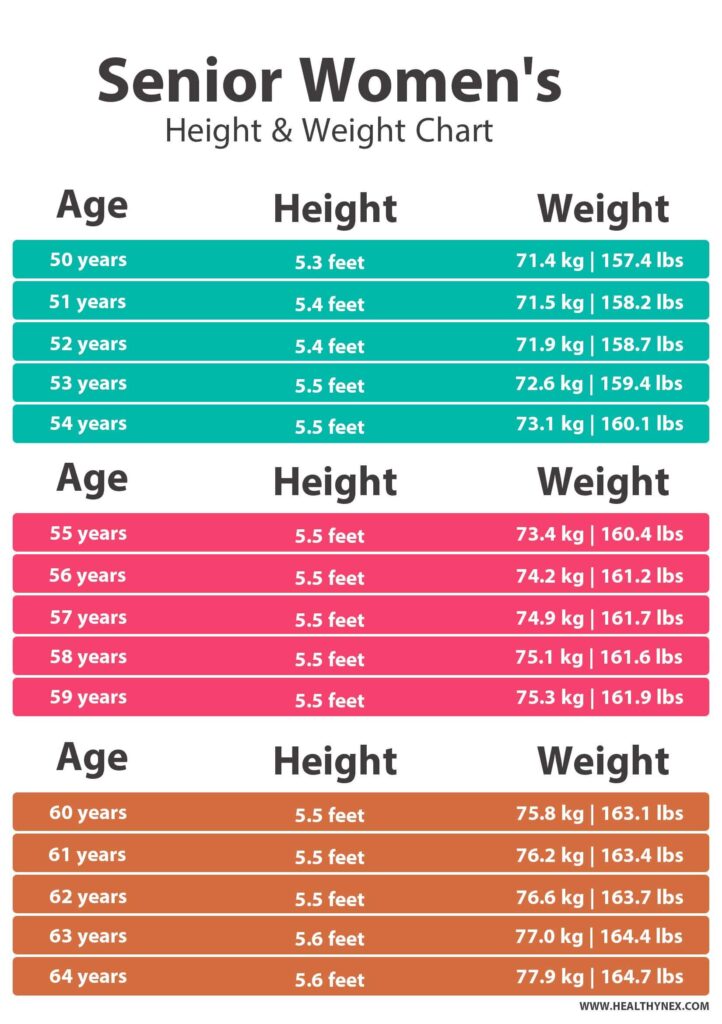If you are a senior female, you may be curious about the ideal weight for your height. BMI is one way to calculate your perfect body weight.
Nevertheless, BMI fails to consider an individual’s muscle mass or bone density in its calculations. Consequently, it is possible to have a healthy BMI range and still experience conditions typically related to overweight and obesity.
Weight
Their weight can profoundly influence a person’s health. It can affect joint health, bone density, and heart disease. A person’s risk for these conditions increases as their weight increases, so it is important to maintain a healthy body weight. This can be done by following a balanced diet and getting plenty of exercise. It is also important to manage stress, as chronic stress can disrupt hormones and cause weight gain. A good way to do this is by practicing yoga, meditation, and deep breathing.
A BMI range of 18.5 to 24.9 is considered healthy for seniors; however, it may not universally apply to everyone. Many elderly individuals struggle to maintain a healthy weight due to age-related health issues, changes in activity levels, and a decrease in appetite. A dietician can help set up a diet that is tailored to a senior’s unique needs.
In addition, it is essential to get seven to nine hours of sleep each night. Studies have shown that people who get adequate sleep are at a lower risk for high blood pressure, cardiovascular disease, type 2 diabetes, depression, and obesity.
A physician or certified nutritionist should determine a woman’s health and fitness goals. In addition, a certified dietician can help a senior determine the best calorie intake and nutritional supplements for her particular health condition. A dietician can also teach an elderly individual how to properly portion food and make smart food choices.
Moreover, a dietician can help an elderly woman choose nutrient-rich foods that are rich in vitamins and minerals. These can be found in leafy vegetables, lean proteins, fruits, and whole grains. In addition, a dietician can provide guidance on the benefits of regular exercise and managing stress.

Height
A height chart for senior females can help you determine a healthy weight range based on your age and height. These charts can be helpful, but it is important to consider other factors as well, such as body type and muscle mass. A healthy weight for elderly women is a balance between body fat and lean muscle. It is also essential to get enough exercise to maintain or build muscle mass and bone density.
BMI is a widely used measurement that incorporates both weight and height to judge a person’s health status. However, this measurement is not accurate for everyone. For example, it does not take age or sex into account, and it may not be appropriate for older adults. It is also a good idea to monitor your waist-to-hip ratio and body fat percentage to avoid health problems associated with obesity.
Overweight seniors are at increased risk for a variety of conditions, including heart disease and high blood pressure. The good news is that there are many ways to improve your health by maintaining a healthy weight, including following a balanced diet, getting enough sleep, and managing stress. It is important to understand that the average height for a senior female varies depending on her frame size, body type, and lifestyle.
Keeping a normal BMI is vital for elderly women to reduce the risk of obesity-related health issues, such as heart disease and diabetes. Obesity rates have increased significantly among older adults, particularly those aged 60 and over. It is important to maintain a healthy weight by eating a nutritious diet and exercising regularly. Adding strength training to your exercise routine can also help you maintain your body’s muscle mass and bone density.
BMI
As women age, their bodies experience a number of changes. These include an increase in body fat, which can lead to a variety of health issues & problems. Maintaining a healthy weight is the best way to avoid these issues & problems. However, many women find it difficult to determine whether or not they are in a healthy weight range. One way to determine this is to use a BMI chart. A BMI chart is a tool that combines height and weight to indicate if you are underweight, healthy, overweight, or obese. The charts are available online and in magazines geared towards seniors.
The BMI calculator is a simple calculation that uses your height and weight to determine your ideal weight. It will show you a healthy range for your body type, and it will also help you set realistic goals to lose weight. However, it is important to remember that BMI is only one factor to consider when determining your ideal weight. Other factors to consider include muscle mass, hydration, and activity level.
Although BMI is a useful indicator of health, it can be misleading for older adults because it does not take into account gender or race. Additionally, it can be inaccurate if you have a large amount of body fat. For these reasons, it is important to consult a doctor before using a BMI chart.
For a senior female, a healthy BMI falls within the range of 18.5 to 24.9. Overweight and obese people are at increased risk for heart disease, high blood pressure, and diabetes. Maintaining a healthy weight can help prevent these diseases and reduce the risk of death. The best way to achieve this is to eat a well-balanced diet, exercise regularly, and manage stress.
Healthy foods
It’s no secret that a poor diet is a major risk factor for many health conditions for seniors. However, changing a senior’s eating habits doesn’t have to be difficult or time-consuming. The key is to focus on healthy foods that are easy to prepare and enjoyable.
Fruits, vegetables, whole grains, and protein are all essential for a well-balanced diet. Look for food options that are low in sodium, sugar, and saturated fat. Choose lean meats, fish, and poultry, and avoid fried foods and junk food.
Leafy greens like kale, spinach, and dandelion greens are important superfoods because they have high doses of Vitamin K that aid in blood clotting and help reduce bone fragility. Add them to a salad or cook them in a pasta sauce for an easy, tasty way to get your Vitamin K.
Try adding legumes, such as beans, peas, and lentils, to your meals for a good source of protein. Additionally, they serve as an excellent source of fiber and various essential nutrients. Choose dairy products that are low in saturated fat and added sugar, such as skim milk and non-fat yogurt. Add in a few cups of green tea, which is rich in antioxidants and can act as an appetite suppressant.
If you’re unsure of how to fit healthy food into your daily routine, ask a healthcare professional for advice. They’ll be able to help you create a meal plan that suits your lifestyle and health goals. They’ll also be able to recommend a variety of healthy foods for seniors that are easy to prepare and tasty.
Exercise
A healthy weight is an important aspect of a senior woman’s overall health. It helps her avoid disease and maintain her independence. However, every woman is different and must find her healthy weight range. While a height and weight chart can help, it is also important to consult with a doctor or nutritionist for advice.
The ideal body mass index (BMI) for seniors is between 18.5 and 24.9. Seniors need to avoid losing too much weight because it can decrease muscle mass and increase the risk of osteoporosis. Moreover, senior women who have a normal BMI range are at a lower risk of death and life-threatening diseases than those with an abnormal one.
If you are having difficulty maintaining a healthy weight, try to get more sleep. Studies show that sleeping too little can make it harder to lose weight and is linked to obesity and other chronic health conditions. In addition, you should exercise to maintain muscle mass and build bone density. You should include a variety of exercises, such as walking, swimming, and cycling.
You should also try to get at least seven to eight hours of sleep each night. Getting enough sleep is crucial for your health and can reduce the risk of many diseases, including high blood pressure, heart disease, depression, and diabetes
Disclaimer:
The information provided in this article is for general informational purposes only and is not intended to be a substitute for professional medical advice, diagnosis, or treatment. Always seek the advice of your physician or other qualified healthcare provider with any questions you may have regarding a medical condition, weight management, or overall health. The weight chart and guidelines offered here are based on general data and may not be applicable to every individual. Reliance on any information provided on this website is solely at your own risk.



